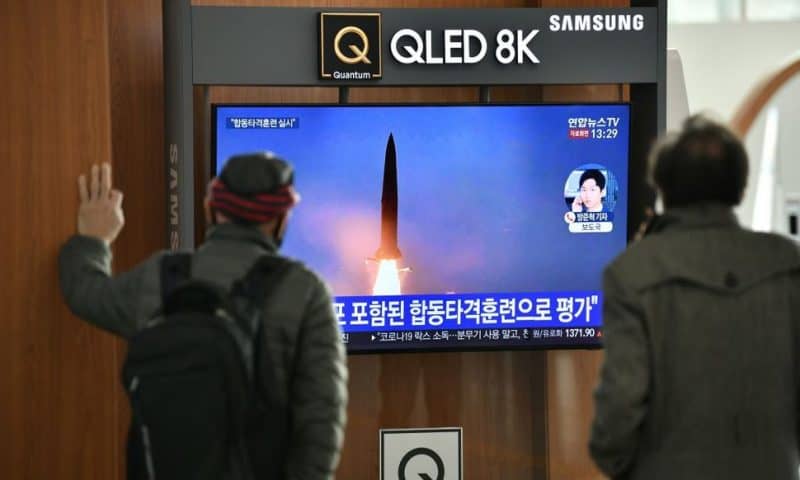What analysts consider an unusual and provocative move, the White House calls ‘a normal part of the kind of testing that North Korea would do.’
NORTH KOREA test-launched a short-range missile over the weekend, the Biden administration confirmed on Tuesday, downplaying it as “in the category of normal military activity” despite the conspicuous timing of what analysts consider an unusual and attention-grabbing move.
The “short-range system” is not limited by U.N. Security Council resolutions, which “probably gives you an indication of where it falls on the spectrum of concern,” a senior U.S. official told reporters in a hastily organized call late Tuesday. The test falls within what the official called a “familiar menu of provocations” by the hermit kingdom.
“Experts rightly recognize what took place last weekend on falling on the low end of that spectrum,” the official said. “It is a normal part of the kind of testing that North Korea would do. We do not believe it is in our best interest to hype these things.”
News of the launch puts the Biden administration under new pressure, particularly from China hawks and supporters of President Donald Trump who made overtures to North Korea one of the cornerstones of his foreign policy, despite having no tangible evidence of success regardless of a dearth in its test of nuclear weapons or long-range missiles in recent months.
Pyongyang as of Tuesday evening had not confirmed the missile test. However, the White House confirmation comes less than a day after North Korea signed a new cooperation pact with China, a move analysts said served as a clear threat to the U.S. under President Joe Biden’s leadership: Don’t try to challenge their interests as then-President Donald Trump did.
North Korea confirmed that new agreement in its own state news service Tuesday morning, saying reclusive leader Kim Jong Un “stressed the need to bolster up unity and cooperation between the two parties and the two countries in order to cope with the hostile forces’ challenges from all directions and their obstructive moves,” specifically citing South Korea and the U.S. Kim applauded Chinese leader Xi Jinping’s ability to “firmly protect socialism from the frantic slander and pressure by hostile forces.”
Top officials for the region have not focused on North Korea as a potential flashpoint in recent weeks.
Navy Adm. John Aquilino, whom Biden nominated to become chief of U.S. Indo-Pacific Command, said at his confirmation hearing Tuesday that Taiwan serves as China’s No. 1 priority. He warned about attempts by Beijing in the near future to move toward annexing the island that it considers a renegade province, telling the Senate Armed Services Committee, “the rejuvenation of the Chinese Communist Party is at stake.”
The Washington Post first reported on the suspected launch.
Diplomatic outreach from the U.S. to North Korea has stalemated for more than a year, with both countries confirming in recent weeks that calls from Trump, then Biden have gone unanswered. The Biden administration is in the midst of a government-wide review into its North Korea policy, expected to conclude in the coming weeks.
Analysts have wondered whether Pyongyang would attempt to ratchet up pressure on the new U.S. administration.
“The news of North Korea’s short range missile tests over the weekend appears to be a relatively subtle message to the Biden administration that time is running out for restarting direct talks. If confirmed, this would be a highly unusual move by Kim Jong Un, since there were no bombastic statements accompanying the tests,” Jessica Lee, senior research fellow for East Asia at the Quincy Institute for Responsible Statecraft, said in an analysis note.[
Lee faults the administration for a lack of clarity regarding Pyongyang’s nuclear program, including muddled language on, for example, whether it calls for the permanent denuclearization of the entire Korean Peninsula or just North Korea. And policymakers appear to have focused less on the hermit kingdom amid an administration-wide focus on countering China, what the Defense Department calls the primary “pacing challenge” it faces.
“What is urgently needed is to signal the U.S.’s intent in a real negotiation with North Korea, putting all of our carrots and sticks on the table, such as a formal end of war declaration, lifting of travel ban and select sanctions, as well as a clear process for replacing the 1953 armistice with a peace treaty as part of a comprehensive deal that addresses both nuclear, political issues,” Lee said.
Harry Kazianis, senior director of Korean Studies at the Center for the National Interest, believes the tests likely showed that North Korea anticipated Biden was planning new sanctions for its aggressive activities.
“Pyongyang, through these new missile tests, is signaling to team Biden that its military capabilities will continue to get more potent with each passing day,” Kazianis says. “Even with a pandemic and international sanctions still in place, North Korea still can cause the death of millions of people in minutes, and any missile test of any range or scope only reinforces such a terrifying reality.”

